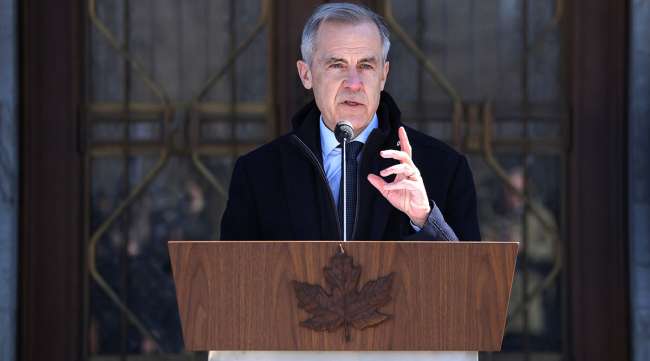Canada Prime Minister Mark Carney says “nothing is off the table” when it comes to defending Canada, its workers and businesses. (David Kawai/Bloomberg News)
Prime Minister Mark Carney says Canada will fight back against President Donald Trump’s trade war and his tariffs on the auto sector, but he did not outline any new retaliatory measures against the U.S. on March 27.
The Canadian government will respond based on what the U.S. administration does April 2, the day Trump has promised to unveil another round of import taxes, Carney told reporters in Ottawa after holding an urgent meeting with a Cabinet group that’s focused on Canada-U.S. relations.
Carney said Trump reached out March 26 for a call and he expects that conversation to take place in the “next day or two.” The two leaders have not spoken since Carney was sworn in as prime minister March 14.
“Nothing is off the table” when it comes to defending Canada, its workers and businesses, Carney said.
The prime minister had canceled election campaign events in Quebec to fly back to Ottawa after Trump announced the tariffs March 26.

Canada has already imposed retaliatory tariffs on C$60 billion ($41.9 billion) in U.S. products in response to Trump’s import taxes on an array of Canadian goods, including steel and aluminum. Canada has threatened further levies on tariffs on C$95 billion in American items, including autos, as soon as next month.
Trump signed an order March 26 to implement a 25% tariff on auto imports starting at 12:01 a.m. Washington time April 3. The order addresses the integrated nature of the sector in North America — giving at least some temporary wiggle room to automakers and to Canadian and Mexican manufacturers. The order says the tariff will apply to the value of non-U.S. content in finished vehicles imported under USMCA and that USMCA-compliant car parts will remain tariff free until a process can be created to apply the levy to their non-U.S. content.
RELATED: Most Carmakers Stand to Feel Pain From Trump’s Auto Tariffs
Still, the auto tariffs mark a significant expansion of Trump’s trade war with Canada and a blow to the northern nation’s manufacturing business. The country shipped nearly C$50 billion ($35 billion) of vehicles into the U.S. market last year, and General Motors Co., Chrysler parent Stellantis NV, Toyota Motor Corp. and others all have assembly plants in Ontario.
Carney called a snap election for April 28, seeking a mandate from voters after he won a Liberal Party race to replace Justin Trudeau as party leader and prime minister. Most polls put him in a tight contest with Pierre Poilievre’s Conservative Party, a stark change from earlier this year when the Conservatives led by about 20 points.

Ford
Ontario Premier Doug Ford said he spoke with Commerce Secretary Howard Lutnick. Lutnick confirmed to him that the order means auto parts won’t be hit with an immediate tariff and that finished vehicles with U.S. parts will face a tariff rate lower than 25%. A car with 50% U.S. parts would face a tariff of 12.5%, Ford said.
Ford told reporters Lutnick did not give him any assurances there would be any easing or softening of the tariffs.
When Ford was asked whether Lutnick knows what Trump is planning to announce April 2, he said. “I think he has an idea.” Then the premier added: “Or maybe he doesn’t. That’s even scarier if he doesn’t. So let’s see what they come forward with on April 2, but we’re prepared, we’re ready.”
Ford said the provincial premiers would meet with Carney on March 28, and he is looking at scheduling a trip to Washington after April 2. The premier said he has no plans “yet” to bring back his threatened export tax on electricity shipments to the U.S.
“Americans need us. I told him,” Ford said of his call with Lutnick, adding he’s “not sure” if the Trump administration understands the North American vehicle supply chain. “They don’t have the people down there to fill the jobs.”
Canadian Trade Minister Dominic LeBlanc also spoke with Lutnick about the auto tariffs, and they committed to keep the lines of communication open, said a person familiar with the conversation.
In a late March 26 Truth Social post, Trump threatened to slap additional tariffs on the European Union and Canada if they joined forces to cause “economic harm” to the U.S.






